David Moyes’s early period at Everton was helped by the emergence of the club’s most outstanding youth player in living memory. On the opening day of the 2002-03 season the 16-year-old Wayne Rooney joined Tomasz Radzinski and Kevin Campbell in a three-pronged attack. He was soon to write his name in football immortality.
Howard Kendall
My final act as Everton manager had been the Coventry City game [at the end of the 1997-98 season]. My penultimate one had occurred at Goodison three nights earlier, when the youth team lifted the FA Youth Cup. Leon Osman, Tony Hibbert, Francis Jeffers, Richard Dunne and Danny Cadamarteri all played a part in the two-legged win. Between them they would make more than 800 appearances for Everton and three of them would earn international recognition. The credit was all Colin [Harvey]’s really, for he was youth team manager at the time, but it happened under my watch. I suppose you could say it was the final act of a partnership that had lasted off and on for more than 30 years. I remember asking Colin at the time who he had coming up through the ranks. Colin doesn’t mess about; he’s very direct. If someone stands a chance of making it that won’t be enough; it’s got to be special for Colin to pay attention. He looked for something outstanding, extra special. “Only one,” said Colin. “He’s 12 years old. His name’s Rooney.”
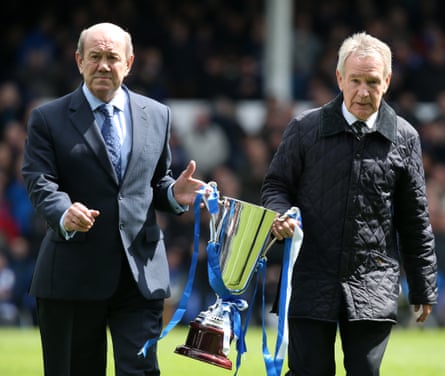
Colin Harvey
I used to go on a Sunday morning and watch the different age groups, and I usually watched the under-15s and the under-16s because they were the next intake. Anyway there was an injury in one of the games I was watching, I walked over and the under-10s were playing. There was a coach named Dennis Evans, who was a very good coach; coached basketball and other things, a good all-round coach. This kid picks the ball up on the halfway line and slaloms past about four players, lashes it in the top corner. I said: “Who’s that?’ He said: “Wayne Rooney.” And I’d heard of him but I’d never seen anything of him. Anyway he does it again about quarter of an hour, 20 minutes later. I said: “Dennis?” He said: “He does that every game. It might be three or four times he goes past five or six players.”
Walter Smith
I always remember Colin said: “You’ll have to take a look at this boy we’ve got. He’s playing in the Under-19 team,” and we went: “Under-19 team?” He said: “Aye, he’s only 15.” We were saying to each other: “How can a 15-year-old play in the under-19s?” We were able to sit in the manager’s office and we used to go in and do a bit of training Saturday morning before our game. And there was a game on. They were playing Manchester City and I’ll never forget it. Archie [Knox] and I were sat at the window looking at it and I said to Archie: “That boy’s coming on that they are talking about, that lad Rooney.”
Michael Ball
I was still young and I loved going to the Youth Cup games. When I was a youth player I’d love when Tony Grant was watching or when John Ebbrell would watch. You want to impress the manager but you want them to talk about you. To this day I don’t know who I was talking to, I was sitting there. There was a free-kick like 10 yards inside ... I can’t remember who they were playing now ... in their half, so normally a centre-half or a full-back would take it and this lad hit it and hit the bar. The ball bounced, he ran on, shot and it went in. I’m thinking: “Who’s that? What’s he doing shooting from there?” That’s when they started talking. I never knew anything about Wayne, that’s when they said: “He’s going to be a boy, this one.”
Tony Hibbert
He was doing well in the academy and playing in the Youth Cup. I remember watching some goals and as you’re there you get to hear about the next lads – “This lad’s this and this lad’s that” – being in the place you hear this. So when they come in to train you’re looking for that and with Wayne it was so, I wouldn’t say easy, it was just so natural. Nothing fazed him. So with him stepping up as a 15 to 16-year-old to playing with grown men in a first team was no different than playing in the park with his friends for him.
Archie Knox
He was a flippin’ Roy of the Rovers at that level. Some of the stuff he could do; he would just get the ball and run right through the other team. From the halfway line or something, run straight and score.
Colin Harvey
You see the background he’s from, he’s from the middle of Croxteth. I always used to go in early and I was going in about 6am one morning, a summer’s morning, and there were five kids crossing the road ahead of me. He was one of them. He didn’t see me and I drove past. I phoned his dad up later that day and I said: “Come in with him whenever you get a chance tomorrow, either before school or after.” So he came in with his dad and I said: “Do you want to be a footballer or don’t you want to be a footballer?” He said: “What you on about?” I said: “Well I saw you yesterday morning.” He said: “No you didn’t.” I said: “Yes I did. You were crossing the road not far from where you live.” He said: “I’d been at a sleepover at my mates and we’d just got up early and went out for a walk.” And there were five of them, and if they weren’t on pot they were going to be on it sooner or later. You just looked at their faces. I said: “Well if you’re going to knock around with them, knock around with them, otherwise get yourself away from them and you’ve got a chance of being a footballer.” And he went out then. His dad said: “I’ve been dying to say that to him for ages.”
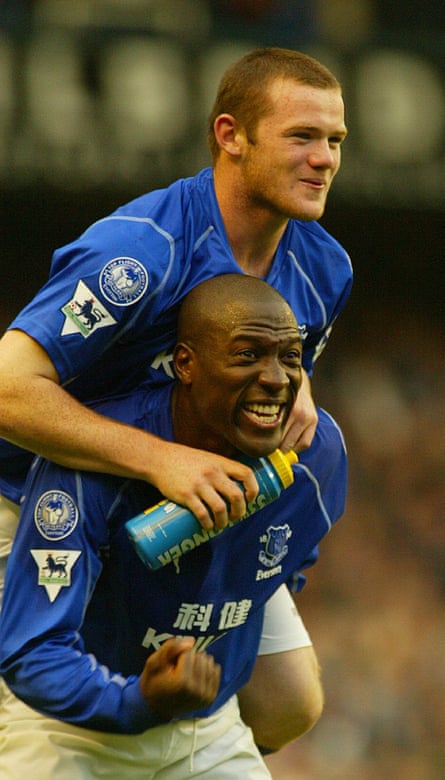
Kevin Campbell
I played with Wayne when he was 14, that was my first game with him. I think we were playing Southport in a friendly. I was just coming back from an injury, so I was going to play 65 minutes in a friendly at Southport. And there was just this young kid who looked like a baby on the bus. Andy Holden said: “He’s your strike partner up front. Treat him like a first-team player.” I laughed. He said: “Kev, you’ll see.” I played with him and by the time I came off it was 3-0, Wayne had got two, I’d got one and even at 14 I was like: “You’re kidding me.” You could tell he was just special. Straight from school he came and joined the first-team squad. It was uncanny that he was so good. But he was going to be the future of the football club.
Colin Harvey
I took him to Coventry for an under-18 game and he’d be about 13. I took him as a sub and we were getting beat 2-0. We had a lad called Nick Chadwick, who went on to score quite a few goals in the lower divisions. So I brought him off, put Wayne on and within a minute he’d bent one and hit the crossbar, put someone else through and scored a goal. And Nick went: “Who’s this kid?” I said: “It’s Wayne Rooney.”
David Unsworth
John Murtagh pulled me one day and said: “Come and look at these two goals that this 15-year-old kid has scored for our youth team last night. He scored two goals against Tottenham.” And I was like: “Who the hell is that? And before I knew it at 16 he was playing with our first team and we couldn’t even catch him to kick him let alone tackle him.
David Moyes
They were playing Tottenham in the semi-final. It was on at Goodison, a two-legged game at that time. They asked me to sit in the gantry, I was doing a bit for Everton. I was in the gantry looking down and Wayne was stunning. I remember I walked down, this would probably be about April time, and the boys had come back on the pitch for a cool down. I remember going up and tapping him on the shoulder and saying: “You’ll be with me next year.” I didn’t know him and he was a really shy, quiet boy. As it was we called him up, he was on the bench at Southampton that year. We had to get permission to get him out of school and all the things that went with it.
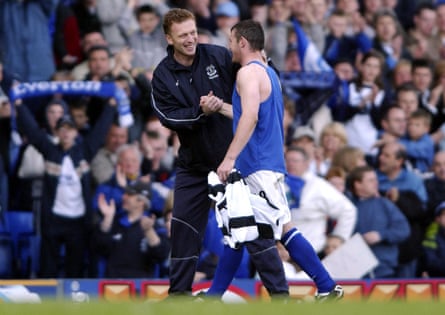
Colin Harvey
He was very, very mature. I remember we used to get him up Tuesdays and Thursdays. We were training at the Thornton, and I used to go back to Bellefield with him. He’d come in for his lunch; he’d have his school blazer on and not a word was said to him. If it had been any other kid they would have got the mickey taken out of them but no one said a word. He just walked in, sat down, had his lunch and then we’d drive back and I’d drop him at De La Salle. If I didn’t say something to him he wouldn’t open his mouth all the way back. Just a dead quiet kid. Dead humble.
Alan Irvine
I think Wayne would have been a player wherever he was. Quite simply he had lots and lots of attributes. Bear in mind, I was there at the time, he left school and came straight in to work with the first team, and wasn’t out of his depth. That’s really, really hard to do. Other 16-year-olds who have broken through at Everton came in, spent a bit of time with the academy and then gradually came into the first team, whereas Wayne came in straight away and stayed and started to play a part in the games and all that right from the beginning.
Jimmy Martin
I got to know Wayne quite well, I’d drive him into Bellefield. He used to come in to the kit room in the afternoon after training. “Can I have a bag of balls Jimmy?” he’d ask. He was well-mannered, a good kid; very shy kid; and he used to just say: “Can I have a bag of balls and go and have a little kick?” And he’d go on the pitch in the afternoon, maybe an hour, hour and a half, and just practise. That was Wayne Rooney. That’s why he’s a good as he is today.
Alessandro Pistone
I believe Moyes was clever to treat a player like Rooney as he did, because Wayne started training with us in pre-season, so we always had the sensation he was a great player. We knew that. We knew he was going to be a top player. But he did well, the manager, to let him play not every game. He gave him the time to grow by himself, not to try and rush him.
Tomasz Radzinski
To be honest his training sessions were way more impressive in the beginning than his games with the first team. I think he must also have been a little bit overwhelmed from being at this young age in the Premier League, although he didn’t look like he was. But whatever he was showing us in training, he was still twice as impressive as it was when he was playing actually in his first minutes in the Premier League, this is how good he was.
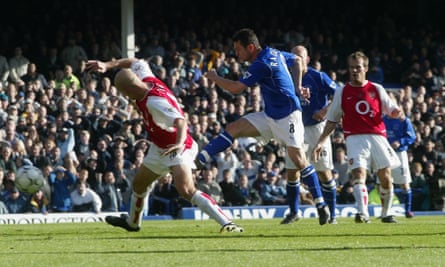
David Moyes
He had childish behaviour, he’d run out and want to kick all the balls away, the sort of thing a kid would do, but we loved it. Wayne was then 16, 17, he was hanging about with real senior players. We had to make sure he wasn’t led too far away from a path that a young player should be on. He was a really good boy; he loved his football and that was the biggest thing for me. His love of football, the love of kicking the ball, the love of being on the ball was probably the thing. I think when you see people like that it really thrills you.
Jimmy Martin
He was the last of the street footballers. I’d drop him off and he’d go straight out in the street and play with his mates. He just wanted to play football.
On 19 October 2002, Arsène Wenger’s Arsenal arrived at Goodison. The Premier League champions were undefeated in 30 league games. In the final minute Rooney’s dipping, curling shot from 30 yards beat David Seaman, crashed off the underside of the crossbar and over the line. It was one of Goodison’s finest goals.
David Moyes
There’s only a couple of times when I’ve left Goodison, when you’re in the changing room at Goodison, down in the walls and you can hear the crowd a little bit going out. There’s probably only two or three occasions where it was rapturous down the whole street, everybody. That was one of the days, because of the result and the introduction of Wayne as well. He was one of their own – probably half of the supporters might have known Wayne from playing in the streets with him, or bumping into him, or going to school with him. I think when it’s like that and you know somebody who’s so good and has scored that goal, I think it really means an awful lot to people.
Faith of Our Families: Everton FC, an Oral History (deCoubertin), edited by James Corbett, is released on Saturday 28 October. Pre-order here
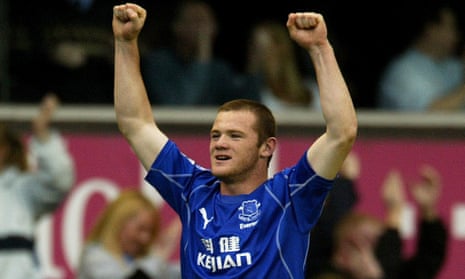
Comments (…)
Sign in or create your Guardian account to join the discussion